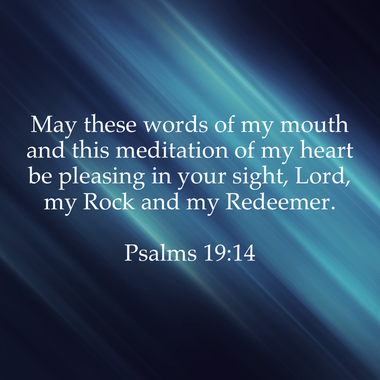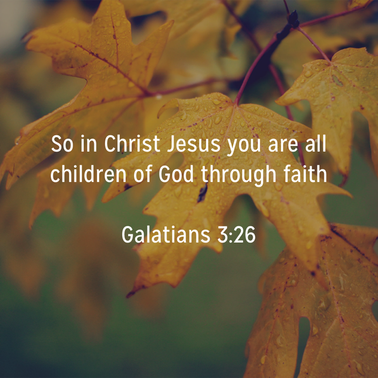|
Good morning!
We're so glad you chose to join us today!
When we meet in person, we share our joys and concerns. If you have any prayer requests you would like to share, you can add it as a comment to this post. When you are ready, use the prayer below (source) to get started.
O Lord Unite all. Let the religions agree and make the nations one, so they may see each other as one family and the whole earth as one home. Amen.
This week's lesson is on Ezekiel 37:21-28.
Hearing, accepting, and trusting God's Word involves more than just intellectual ability. It requires us to reorient our desires. We must want to trust, to hope and to love. Today's text helps clarify this needed reorientation.
Ezekiel lived at the time Jerusalem fell to the Babylonians in 586 BC. The destruction and accompanying exile was preceded by two other deportations. The first of those came in 605 BC, when Daniel and his friends were taken captive to Babylon. Ezekiel's relocation to Babylon became part of the second deportation as he found himself among the 10,000 of the elite citizenry taken in 597 BC. Daniel and other Jews were taken to serve “in the king's palace” while Ezekiel found himself “among the exile by the Kebar River” where “the hand of the Lord was on him”. The book of Ezekiel features many astonishing word pictures. One of the most famous is the valley of the bones, in Ezekiel 37:1-14. Ezekiel has a vision of the bones reconstructing themselves and becoming flesh. It is followed by a least famous illustration of two sticks which represent Judah and Israel coming together as one nation. Verse 21 introduces a series of specific future realities that together paint a picture o a new life to come. The predicted reality of the Israelites being regathered into their own land had been stated before. It was a message that bore repeating and was repeated by other prophets as well in Isaiah, Hosea and Amos. The dispersion and scattering of the Israelites continued into the time of Jesus. It seems unlikely, therefore, that the prophets expected each and every person of Israelite descent to return to Palestine. As the books of Ezra, Esther and Daniel make clear, some Jews chose not to return to the homeland, and they continue to live in Gentile settings. There they continued to reflect deeply on how to maintain faith as a minority that was often prosecuted. Even so, the return home and rebuilding of the temple signaled to everyone the presence of God. The one nation of Israel had split into two nations in 931 BC, following the death of King Solomon. That situation may have seemed permanent, given the facts of two exiles (Assyrian and Babylonian) and the passage of three and a half centuries. But Ezekiel expected the 12 tribes to be reunified nonetheless. Promises such as Ezekiel's here came to be seen not as literal predictions of a singular human king ruling in a specific place, but as anticipating the Messiah, whose rule would encompass all things. The forthcoming restoration was also to be characterized by the end of idolatry in all its forms. The worship of false gods was the prime reason for all of Israelites' other problems. It had led to the defilement of the land in general and of the temple in particular. Cleaning the land and the temple of such religious filth would be important. Cleaning idolatry from hearts would be all more so. Ezekiel prophesied the future would be different. Ezekiel did not think that the people could completely purge idolatry by their own willpower. Rather, God was to cleanse them. The people would experience the sort of physical and spiritual purification necessary for anyone going to the temple to worship. The forthcoming purification would affect all of life-life with God and life with one another. They will become God's people. Anyone who rules over God's people should function as a shepherd. That designation describes someone who protects others from harm. The one shepherd to come would stand in stark contrast between the worthless shepherds who exploited the people. People tend to behave as their leaders do, and this fact was the driver of ending up in exile. The shepherd king will be a model of behavior that reflects the opposite, the result will be an era of justice, in which faithful people obey God's laws and decrees fully. The focal point of the people's renewal was to rebuild the temple in Jerusalem. That building was a symbol of God's abiding presence among the people. The promised peace would therefore be more than a mere absence of conflict. Rather, it was to be a condition in which the people would flourish as God intended. Ezekiel insisted that the new arrangement would be permanent given the terms everlasting and forever are translations of the same word forever.
Conclusion: Finding Life Again
Rebuilding a community after any kind of disaster is difficult work. For progress to be made, those affected must acknowledge their pain, find resources for renewed hope and take practical steps to build a new life. The Judean prophets took precisely those steps during and after the Babylonian exile. God made sure that they did. Connecting practical steps with the values, commitments and dreams of a congregation presents an ongoing challenge, as all church leaders know. We easily drift into saying, “We must do something; here is something; therefore, we must do this.” Clear thinking about why we need to act in a certain way easily gets lost. Ezekiel made sure that his audience thought deeply about what to do and why. He held out the hope not just of reclaiming lost spaces and practices, but of reentering the deeper meaning of those very spaces and practices. We need constant renewal in this regard. Before assuming that “God is on our side” we should ask, “Are we on his?” The latter question will invite a season of self-reflection and prayer. That in turn puts us in a position for being equipped “With everything good for doing his will... through Jesus Christ, to whom be glory for ever and ever.” Prayer God of all generations, who restores and renews us after catastrophes of our own making , grant us a deeper sense of your presence in our lives. May your church then become an example to all the world of what those created in your image may be. In Jesus' name we pray. Amen
Questions for Discussion
Benediction
This week's benediction is from the New Revised Standard Version.
Next week's lesson will be on Zephaniah 3:14-20.
0 Comments
Leave a Reply. |
AuthorWe are a small, rural Presbyterian church in southwestern Pennsylvania. Archives
July 2024
Categories
All
|



 RSS Feed
RSS Feed